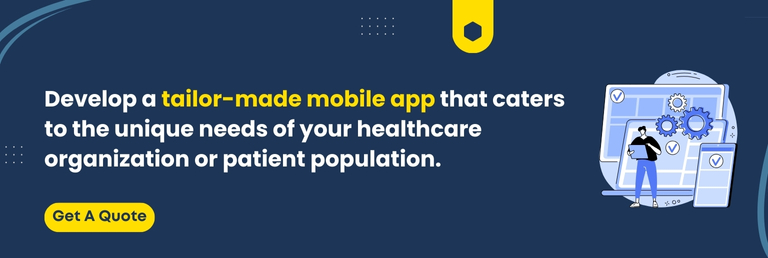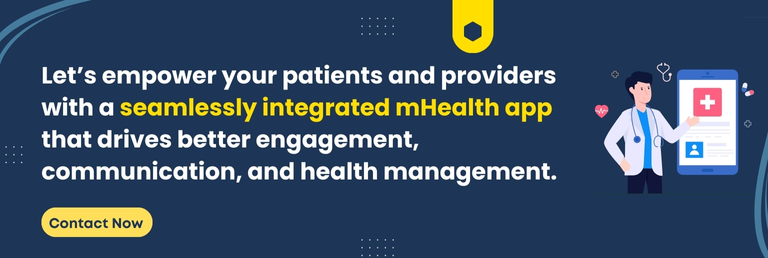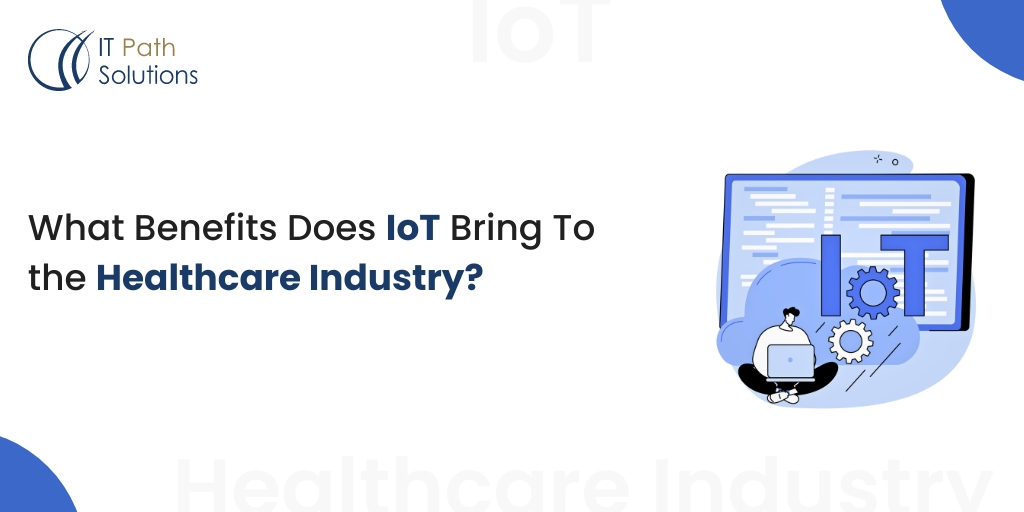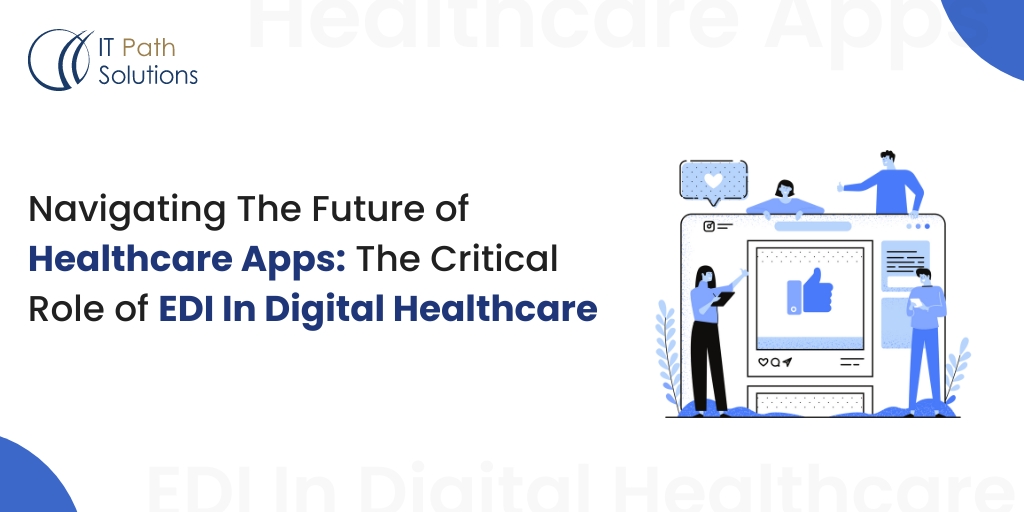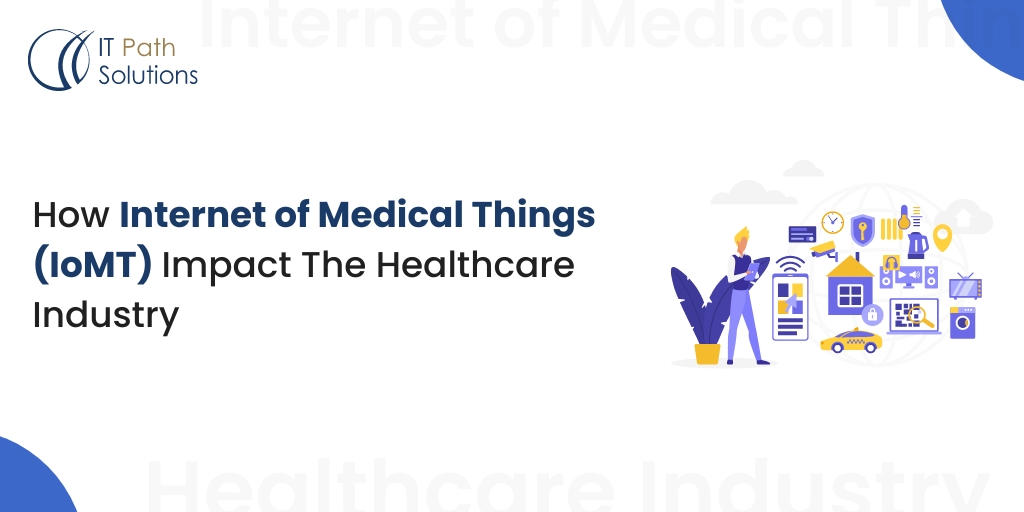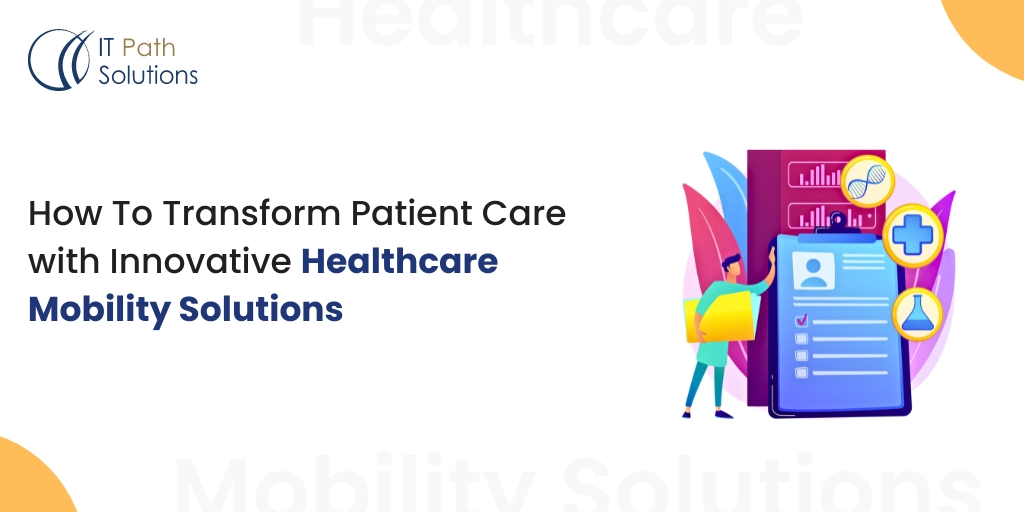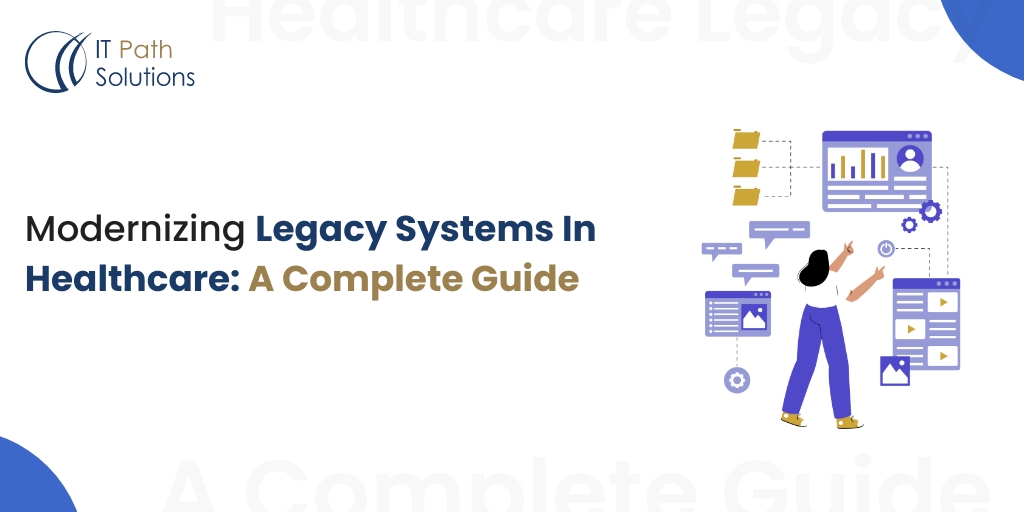Understanding the Essentials of mHealth App Development
Healthcare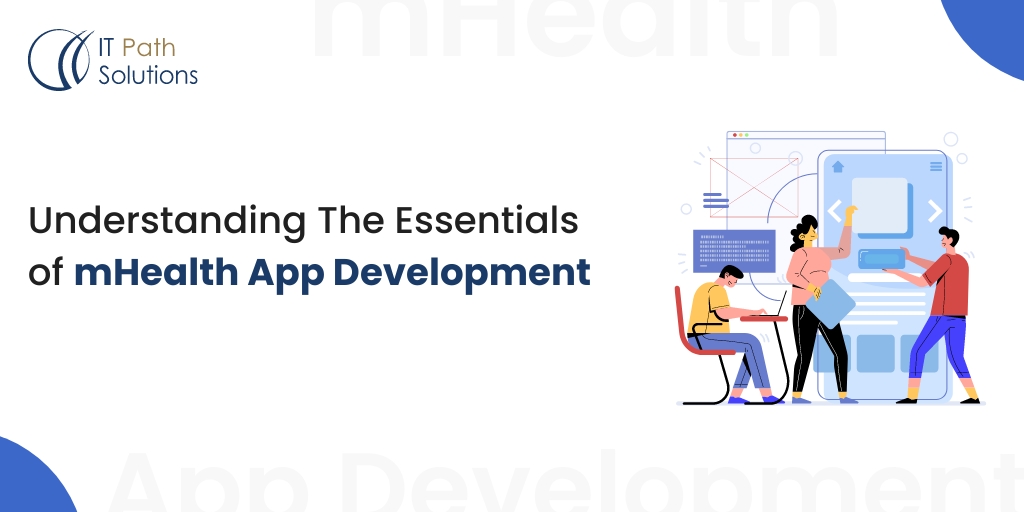
We are standing at the cusp of digital transformation in healthcare. With data and mobiles being an integral part of our daily lives, it is only imperative that we now have mobile healthcare solutions. These solutions will simplify appointment bookings, receive prescriptions, contact doctors, and pay patient bills. For doctors, mHealth apps will provide a seamless way to track patients’ data, monitor their health, and provide guidance promptly using mobiles. The versatility of mHealth applications extends to many other operations contributing to rapid industrial growth which is projected to reach $37.26 bn by 2030.
In this blog, we will learn more about mobile healthcare services and explore how you can play a role in this evolving landscape.
This blog covers the following topics:
- What is mHealth?
- Types of mHealth applications
- Key features of mHealth applications
- Benefits of mHealth
- Challenges in mHealth application development
- Future trends in mHealth
- Cost of mHealth application development
What is mHealth?
mHealth is an abbreviation for mobile health technology. It refers to the process of using technology to develop mobile healthcare applications. These applications are used for health monitoring, capturing medical data, gaining insights, and managing conditions effectively to boost healthcare operations.
It focuses on making patient’s access to healthcare easier while adhering to specific compliance rules and government standards.
Some of the popular mHealth application examples are FitOn, Clue, Welltory, Doctor on Demand, Zocdoc, QuickMD, and many more.
These mHealth applications have successfully bridged the gap between patients and healthcare providers, accelerating remote monitoring, instant communication, and personalized care.
Types of mHealth Applications:
mHealth applications are typically designed to serve both patients and healthcare providers. The applications empower both parties in various ways, which we will discuss further. Let’s look at the app categories designed for patients as well as healthcare providers.
Patient-oriented Apps
Patient-oriented mHealth apps are designed to empower individuals to take control of their health. These apps offer a wide range of functionalities, including:
- Health and fitness tracking
- Medication reminders
- Symptom checkers
- Personal health records management
- Mental health and wellness apps
- Chronic disease management tools
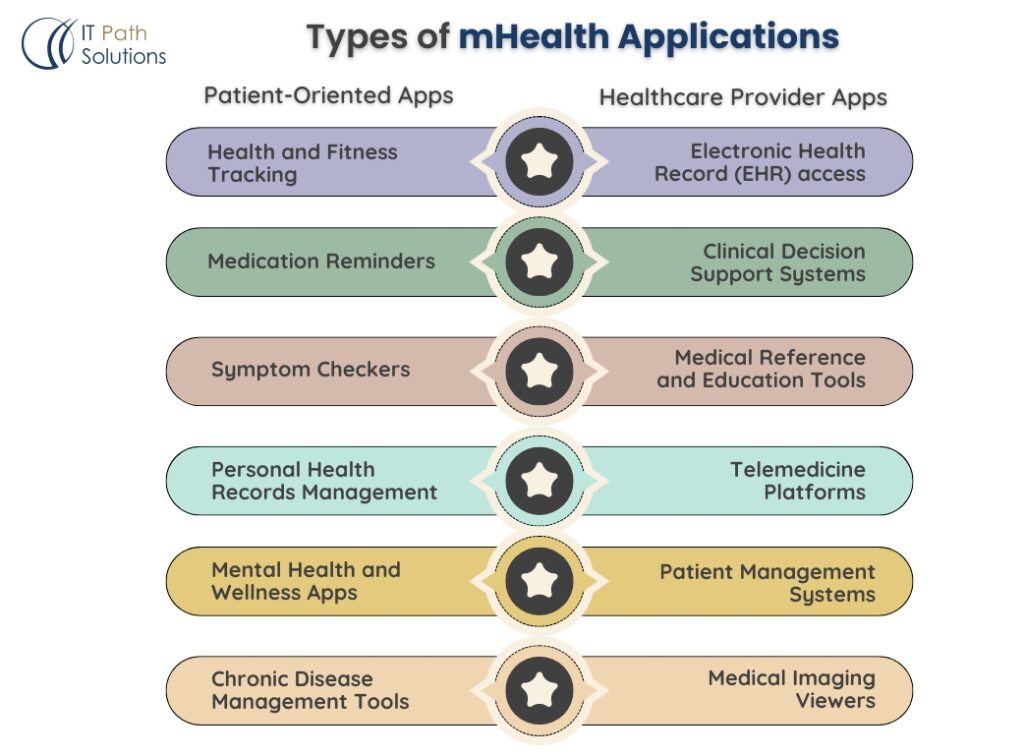
Healthcare Provider Apps
Healthcare provider apps are tailored to meet the needs of medical professionals, enhancing their ability to deliver care efficiently. These apps typically include features such as:
- Electronic Health Record (EHR) access
- Clinical decision support systems
- Medical reference and education tools
- Telemedicine platforms
- Patient management systems
- Medical imaging viewers
Let us understand a few categories of mHealth apps through some examples:
Telemedicine Apps:
Telemedicine apps like Doctor-on-Demand are designed to allow patients to communicate with healthcare providers effectively. End-users can initiate video chats, remote monitoring, and consultation with doctors.
E-Prescribing apps:
E-prescribing apps allow patients to access digital prescriptions, thereby lowering the wait times at healthcare facilities. You would be surprised to know that nearly 2.5 billion electronic prescriptions were written in the last year 2023. And the number suggests that it is only vital to have one of these in healthcare application development.
Fitness and health tracking apps:
Fitness and health-tracking apps assist patients in monitoring their physical activity, nutrition, and overall wellness. The app keeps track of their walking, heart rate, stress level, sleep pattern, etc.
Reminder apps:
Reminder apps like Mango Health remind patients to have their medicine on time and follow the prescribed regimens given by the doctors.
Health information exchange:
The seamless integration of health information exchange apps with EHR facilitates safe information transmission between patients and healthcare authorities. This helps in securing data to a safe database and enhancing secured access throughout the system.
Medical billing app:
Medical billing apps integrate with healthcare providers’ EHR systems and insurance companies to automate the medical billing process. This enables effective submission of claims, reduces errors, and streamlines the insurance process.
Productivity app:
The Productivity app helps in enhancing the healthcare providers’ efficiency and productivity. Such mobile apps can track the activities of healthcare providers’ staff across various tasks spread throughout the day.
Read More: Developing Remote Patient Monitoring Systems: Core Elements and Implementation
Key features of mHealth applications
It is essential to identify the features that will elevate the user experience and make accessing mobile healthcare more convenient than ever. Here is a list of key features to include in your mHealth application:
Appointment Scheduling and Reminders
mHealth apps include features that ease the process of scheduling medical appointments and setting reminders for the same. This feature usually allows:
- Seamless integration with healthcare providers’ calendars
- Allows to book appointments, reschedule or cancel them if required
- Sends notification for an upcoming appointment
- Let the user know about medication schedules and refills
Health Tracking
The health tracking feature empowers patients to monitor various aspects of their health including,
– Physical activity (steps, distance, calories burned)
– Heart rate and blood pressure
– Sleep patterns
– Nutrition and calorie intake
– Menstrual cycles
– Blood glucose levels for diabetics
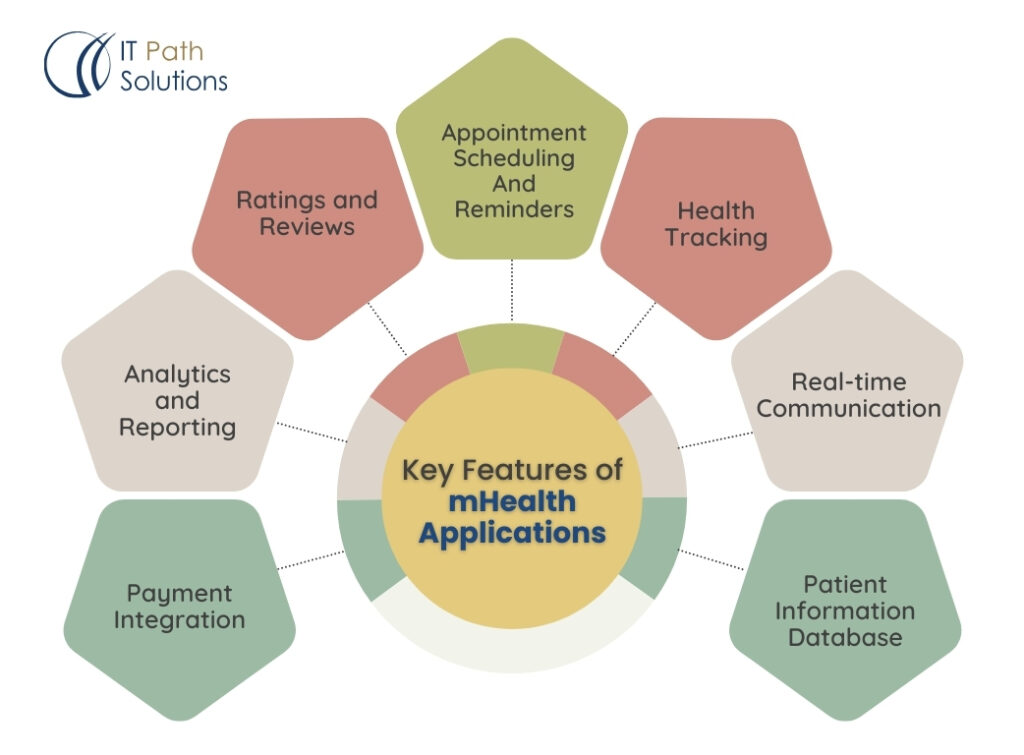
Real-time Communication
This feature communicates effective communication between patients and healthcare providers. From secure messaging to video consultation and file sharing, real-time communication serves it all. The quick and efficient interactions reduce the need for in-person visits and enhance the overall experience.
Patient Information Database
In a world where everything is personalized, why not patient care? A secure and easily accessible patient information database keeps a record of the following:
– Personal health records
– Medical history
– Allergies and current medications
– Lab results and imaging reports
– Immunization records
———> Everything is secure and protected.
This facilitates doctors to have a comprehensive view of a patient’s health status, and make more informed decisions about the patient’s safety.
Payment integration:
Payment is a critical aspect of B2C healthcare services. Integrating an efficient payment system enhances transparency and simplifies bill payments throughout the healthcare process. Patients can use it to pay bills, submit claims, track insurance, and check treatment cost estimates.
Analytics and Reporting:
mHealth applications need to have robust analytics and reporting features to allow healthcare providers to have,
- A view of population health data and research papers
- Performance metrics for healthcare organizations;
- Customizable dashboards for data visualization
- And access to personalized health trends and progress reports.
Ratings and reviews:
This feature gives patients an overview of the healthcare service providers. Based on the feedback, they can make a decision, whether they want to go ahead with a particular doctor or not.
Learn More: Hospital Inventory Management Software: Revolutionizing Healthcare Operations
Benefits of mHealth apps:
Following are the benefits of adopting mHealth solutions in healthcare. It will revolutionize the way healthcare is delivered and consumed.
For patients:
Improved accessibility:
mHealth applications will provide the patient with healthcare access irrespective of their location restriction.
Personalized care:
From the list of features that we have mentioned above, it is pretty evident that the better the access healthcare providers have to the data, a personalized service can be expected.
Convenience:
Mobile booking will help in reducing long queues or no-shows at the healthcare facility.
Cost-effective:
By reducing the need for in-person visits and promoting preventive care, mHealth apps can help lower overall healthcare costs for patients.
Improved health literacy:
With mobile applications on hand, patients no longer have to wait to visit doctors in person. They can simply use the mobile and take necessary precautionary measures and protect their health.
Additionally, mHealth apps also provide patients access to various health-related articles. This helps the patient make informed decisions about their health.
For Healthcare providers:
Enhanced Efficiency:
Mobile healthcare applications streamline administrative tasks, thereby helping healthcare providers to focus on providing personalized care.
Data-driven decision-making:
mHealth helps in collecting and arranging a large pool of data in an organized way. This pool of data remains securely accessible to the doctors, facilitating better decision-making.
Better patient monitoring:
mHealth applications allow more people to approach doctors and communicate in real time. This facilitates early intervention and speedy monitoring in case of emergency.
mHealth App Development Process:
It is always great to create a tailor-made application. Here are the steps that can help you achieve that.
Problem identification:
You need to identify what problem will the app solve. Will it help patients in booking appointments, tracking bills, or consultation or will it help the healthcare provider to manage the operations? Based on this clarity, you can move further to the next step.
Vendor Selection:
For developing a functional and standard mHealth application, it is important to select a development company that is thorough with the knowledge. An experienced company would help you abide by the laws and help you develop a standard application.
Design and Development:
An experienced development company helps you in paving the path for successful development. They will meticulously look into your needs, evaluate your plan, discuss it with you, and then commence the development process.
Testing and Quality Assurance:
The Quality assurance team will rigorously test the application for any bug or functionality glitch. The process ensures that the product delivered to you is bug-free and adheres to technological standards.
Deployment and Maintenance:
The application development team deploys the application on your server and checks for its functioning. The development team also offers long-term support to ensure that you do not face any downtime with the application.
Challenges in mHealth development:
mHealth implementation comes with a few challenges that are negligible and manageable. With the right development partner on board, you can easily overcome these issues related to”
- Compliance;
- Security infringement
- Availability of multiple devices
Compliance:
mHealth applications need to adhere to HIPAA, HL7, HITECH, GDPR, and SaMD standards based on the location of the healthcare service provider.
(– HIPAA (Health Insurance Portability and Accountability Act) in the United States
– GDPR (General Data Protection Regulation) in the European Union
– FDA regulations for medical devices (for apps that qualify as medical devices)
Ensuring compliance with these regulations requires careful planning, documentation, and implementation of robust security measures.
Any non-compliance can lead to heavy penalties or police inspection. However, an experienced app development company like IT Path Solutions knows how to comply with these standards.
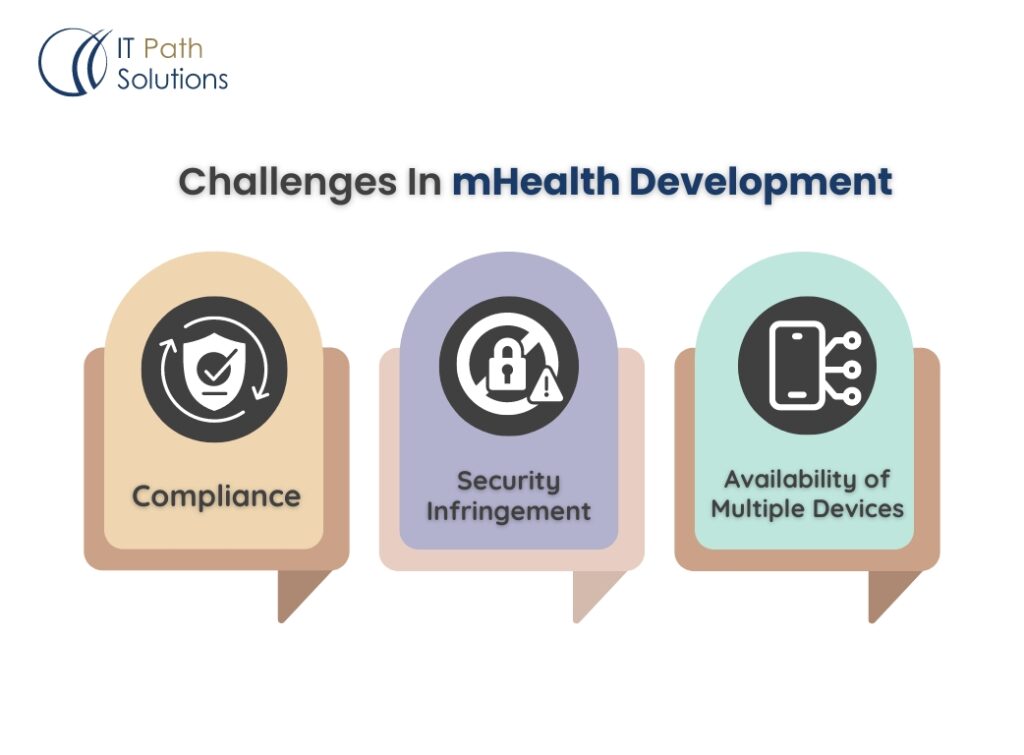
Security infringement:
The security of data is something that everybody should focus on while developing a mHealth application. Securing sensitive patient information is crucial and can be achieved by;
– Implementing strong encryption for data storage and transmission
– Developing secure authentication and authorization mechanisms
– Ensuring data privacy in cloud storage and third-party integrations
– Educating users about data privacy and obtaining informed consent
Availability of multiple devices:
With tons of devices and an operating system available to work on, ensuring that the application runs smoothly across devices becomes critical. The main challenge that you may face is to;
– Optimizing app performance across different screen sizes and resolutions
– Adapting to various hardware capabilities (e.g., cameras, sensors)
– Maintaining consistent functionality across iOS and Android platforms
– Supporting older device models while leveraging new technologies
Future trends in mHealth:
mHealth backed by the integration of advanced technologies will bring a promising future. Here are some future trends to look forward to while developing mHealth.
Wearable device integration:
Wearable devices will collect numerous health-specific patient data such as heart rate, sleep patterns, and activity levels. When this data is interlinked with mHealth apps, it can help in comprehensive health analysis and personalized health recommendations.
AI and Big Data in Healthcare:
AI and Big Data in healthcare will skyrocket healthcare capabilities. Predictive analysis will assist in disease prevention, while Natural Language Processing will improve communication between the patient & the healthcare provider. mHealth will also automate diagnosis and treatment recommendations.
Remote patient monitoring:
The integration of IoT devices and wearable technology will allow healthcare providers to keep track of patient’s vital signs and symptoms of a disease. This way, they can easily detect early signs of a disease and help in taking preventive measures.
Cost of mHealth application development:
The cost of mHealth app development may vary depending on the type of mHealth application you develop and various other factors that are mentioned below.
- Application complexity;
- Platform choice
- Design requirements;
- Integration needs;
- Compliance and security;
- Maintenance and updates;
However, if we are to give you an estimate, the cost of mHealth application development is $20,000 to $40,000.
Conclusion:
From today and onwards, the healthcare market will be blooming with mHealth apps. With your newfound knowledge of developing mHealth applications, it is time to plan your next steps.
At IT Path Solutions, we specialize in developing custom mHealth applications for healthcare providers. We understand the various mHealth application development types and the benefits they will bring to the industry. Let’s partner together to make the healthcare industry more practical and beneficial.
 Healthcare
Healthcare  Education
Education  Real Estate
Real Estate  Logistic
Logistic  Fitness
Fitness  Tourism
Tourism  Travel
Travel  Banking
Banking  Media
Media  E-commerce
E-commerce 